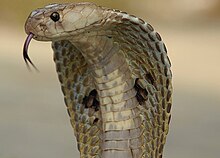Indian cobra
| Indian cobra | |
|---|---|
 |
|
| Scientific classification | |
| Kingdom: | Animalia |
| Phylum: | Chordata |
| Class: | Reptilia |
| Order: | Squamata |
| Suborder: | Serpentes |
| Family: | Elapidae |
| Genus: | Naja |
| Species: | N. naja |
| Binomial name | |
|
Naja naja (Linnaeus, 1758) |
|
 |
|
| Indian cobra distribution | |
| Synonyms | |
|
|
The Indian cobra (Naja naja) also known as the spectacled cobra, Asian cobra or binocellate cobra is a species of the genus Naja found in the Indian subcontinent (India, Pakistan, Bangladesh, Sri Lanka, Nepal) and a member of the "big four" species that inflict the most snakebites on humans in India. This snake is revered in Indian mythology and culture, and is often seen with snake charmers. It is now protected in India under the Indian Wildlife Protection Act (1972).
Naja naja was first described by Swedish physician, zoologist, and botanist Carl Linnaeus in 1758. The generic name and the specific epithet naja is a Latinisation of the Sanskrit word nāgá () meaning "cobra".
The Indian cobra or spectacled cobra, being common in South Asia, is referred to by a number of local names deriving from the root of Nag (नाग) (Hindi, Oriya, Marathi), Moorkhan, മൂര്ഖന് (Malayalam), Naya-නයා (Sinhalese), నాగు పాము (Nagu Paamu) (Telugu), ನಾಗರ ಹಾವು Nagara Haavu (Kannada),Naga Pambu or Nalla pambu (நாகப் பாம்பு/நல்ல பாம்பு) (Tamil) "Phetigom" (Assamese) and Gokhra (গোখরো) (Bengali).
...
Wikipedia
